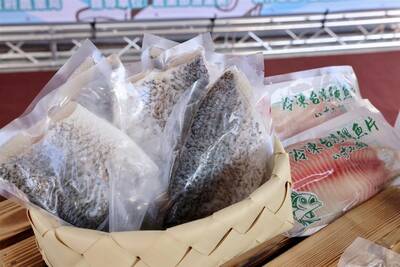Taiwan and China not only need to sign an economic cooperation framework agreement (ECFA), but should also form an integrated community based on the EU model, panelists at a forum in Taipei said yesterday.
“If China agreed to establish an integrated community with Taiwan, it would be a big victory for Taiwan,” said Chang Ya-chung (張亞中), a political scientist at National Taiwan University (NTU).
Chang made the remarks at a forum on the cross-strait trade pact the government intends to sign with China, co-hosted by the European Union Center in Taiwan, NTU’s Cross-Strait and Regional Integration Research Center and National Chengchi University’s (NCCU) Institute of International Relations (IIR).
Chang, who also serves as association chairman for the pro-unification Chinese Integration Association, told the forum that Taiwan could be in a better position to deal with cross-strait issues under such a community framework, adding that even small countries can hold the rotating EU presidency.
He expressed regret that with Taiwan’s political atmosphere, talk of an integrated community would often be misinterpreted as meaning unification.
Wu Tung-yeh (吳東野), a research fellow at the IIR, said the EU integration experience had brought peace, stability and prosperity to its members.
Wu said the fact that most Taiwanese people do not understand an ECFA should not affect whether the agreement is signed or not, adding: “European people do not understand the EU either. Even so, they support economic integration, as they believe it will bring peace.”
Liu Fu-kuo (劉復國), another research fellow at the institute, said signing an ECFA with China was crucial to the country’s development because Taiwan can access emerging economic integration in East Asia through the deal.
“An ECFA would also pave the way for developing a cross-strait common market or community,” Liu said.
Su Hung-dah (蘇宏達), an assistant professor at NTU’s department of political science, said both sides of the Taiwan Strait must overcome barriers to move toward integration, adding, however, that “China needs to first acknowledge the reality that Taiwan exists [independent of China.]”
Su said there was no need for Taiwan to worry too much about the impact of economic integration with China because integration doesn’t mean outright removal of trade barriers between two parties.
At the beginning of his presentation, Wu sparked indignation from an NTU law school student in the audience when he said he did not want to “play a lute for a cow” and would not have attended the forum if the audience had been ordinary people and non-intellectuals.
The student, who is from Tainan, said Wu’s comment showed discrimination against people in southern Taiwan and farmers by suggesting they were not civilized. The students said the forum panelists were all in support of unification with China and were trying to brainwash the audience into supporting an ECFA.
Wu denied the accusation and marched down from the stage as he reprimanded the student for making a scene and attempted to remove the student from the conference.
“Do you want to fight?” the student asked.
Wu said: “Yes, I just want to fight with you. How about it?”
Wu was stopped by others.
In a second attempt, Wu grabbed the student’s clothes and attempted to drag him away before he was again stopped. The brawl ended after the student was escorted out by school security.

Taiwan's Vice President Hsiao Bi-khim (蕭美琴) said Saturday that she would not be intimidated by the Chinese Communist Party (CCP), following reports that Chinese agents planned to ram her car during a visit to the Czech Republic last year. "I had a great visit to Prague & thank the Czech authorities for their hospitality & ensuring my safety," Hsiao said on social media platform X. "The CCP's unlawful activities will NOT intimidate me from voicing Taiwan's interests in the international community," she wrote. Hsiao visited the Czech Republic on March 18 last year as vice president-elect and met with Czech Senate leadership, including

There have been clear signs of Chinese Communist Party (CCP) attempts to interfere in the nationwide recall vote on July 26 in support of Chinese Nationalist Party (KMT) legislators facing recall, an unnamed government official said, warning about possible further actions. The CCP is actively involved in Taiwanese politics, and interference in the recall vote is to be expected, with multiple Chinese state media and TAO attempts to discredit the Democratic Progressive Party (DPP) and undermine public support of their recall movement, the official said. This interference includes a smear campaign initiated this month by a pro-Beijing Hong Kong news outlet against

A week-long exhibition on modern Tibetan history and the Dalai Lama’s global advocacy opened yesterday in Taipei, featuring quotes and artworks highlighting human rights and China’s ongoing repression of Tibetans, Hong Kongers and Uighurs. The exhibition, the first organized by the Human Rights Network for Tibet and Taiwan (HRNTT), is titled “From the Snowy Ridges to the Ocean of Wisdom.” “It would be impossible for Tibetans inside Tibet to hold an exhibition like this — we can do it. because we live in a free and democratic country,” HRNTT secretary-general Tashi Tsering said. Tashi Tsering, a Taiwan-based Tibetan who has never

A first shipment of five tons of Taiwan tilapia was sent from Tainan to Singapore on Wednesday, following an order valued at NT$600,000 (US$20,500) placed with a company in the city. The products, including frozen whole fish and pre- cooked fish belly, were dispatched from Jiangjun Fishing Harbor, where a new aquatic processing and logistics center is under construction. At the launch, Tainan Mayor Huang Wei-che (黃偉哲) called the move a “breakthrough,” marking Taiwan’s expansion into the Singaporean tilapia market. Taiwan’s tilapia exports have traditionally focused on the United States, Canada, and the Middle East, Huang said, adding that the new foothold in